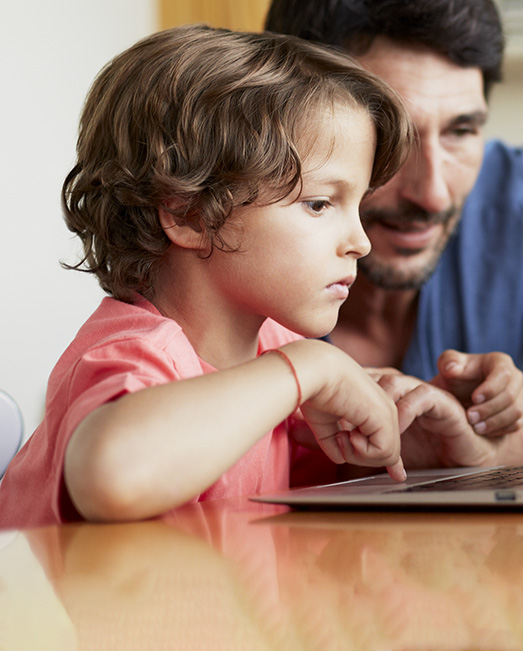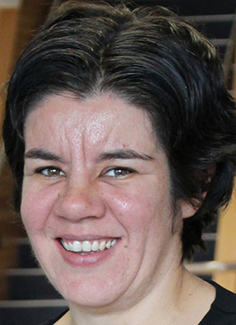Community
Copyright@ Australian Catholic University 1998-2026 | ABN 15 050 192 660 CRICOS registered provider: 00004G | PRV12008
Copyright@ Australian Catholic University 1998-2026 | ABN 15 050 192 660 CRICOS registered provider: 00004G | PRV12008

It’s no secret that social media – the internet-based communication tool that most Australians use regularly – can be a chronic time-waster. Whether you’re a constant sharer or a once-a-day checker, you’ve likely taken the odd trip down a deep hole of procrastination while browsing your platform of choice.
Not even the experts in this field are impervious to the lure of the social network algorithm.
“I sometimes find myself on social media,” says Professor Susan Edwards, a leading researcher in digital practices and cyber-safety education, “and it’s that sudden realisation of, ‘Oh my, there goes half an hour’. But I know that social media platforms are designed to keep me there longer, and I can say to myself, ‘All right, what do you value for yourself right now, Suzy? Do you want to keep your eyeballs here, or is it time to go for a walk?’ So I put the device down and move along. And I teach my children the same thing.”
Among the many fears around the impacts of digital technology on our lives, perhaps the most concerning is the risks it poses to so-called ‘digitods’ – babies, toddlers and pre-schoolers who are using internet-connected devices.
These days, thanks largely to touchscreen tablets and smartphones, many children are accessing the internet before they can read and write. Meanwhile, their parents, caregivers and educators often struggle to traverse this unfamiliar territory.
In response to this novel challenge, researchers like Professor Edwards and the team she leads at ACU’s Early Childhood Futures program have embarked on a series of major projects aimed at ensuring that digital technologies are used in the best interests of young children.
Since early 2020, she has been the chief investigator in a multi-pronged research project, led by ACU and funded by the Australian Research Council, which involves five universities and seven partner organisations including the Australian Federal Police (AFP), ABC Kids and the Raising Children Network.
The project aims to expand the evidence base on the digital practices of children in the early years. The outcome will be a world-first online tool that acts as a hub for resources and programs on cyber-safety education, digital play and digital parenting, as well as a public-facing website with best-practice examples for parents, teachers and caregivers.
The collaborative character of this endeavour has already produced some profound insights into the nature of the issue. The AFP, for example, has deep expertise in online child exploitation. The Raising Children Network knows what information parents and caregivers are seeking on issues like screentime and maximising physical activity. And ABC Kids has access to a captive audience and is eager to explore the latest thinking on using technology as a learning tool.
“They’re all interested in digital tech and young children but they come at it from different angles, and they bring those angles to our conversations,” says Professor Edwards, who is also the lead advisor on the Federal Government’s eSafety Early Years program. “This results in a greater depth of understanding amongst our researchers and partner organisations, allowing us to identify practices and to get a consistent message out to families and educators.”
There are many ways to respond to the challenges of raising children in the digital world.
It would be fair to say, however, that most approaches are guided by an assumption that certain technologies – touchscreens, social media and the like – are either fundamentally good or fundamentally bad.
“Some people think that screens and the internet are ruining children’s childhoods, stripping them of their creativity or displacing physical activity, and they essentially hold a negative view of technology,” says Professor Edwards, adding that these people often try to limit exposure to these perceived risks.
On the other side of the ledger are those who think technology has an overwhelmingly positive impact.
“These people might say, ‘Oh, digital technologies create really good opportunities for children to connect with other children, or to engage with really good content or play open-ended games, and it has all these awesome benefits’.”
People in both camps are engaging in what Professor Edwards terms “technological determinism”. They hold the view (often unknowingly) that technology sets societies on an inevitable path – whether positive or negative.
“Most people – parents and educators included – hold an implicit determinist position,” she says. “They see technology as something that is happening to them in society, so they try to manage the technology to change the social outcome.”
But technological determinism isn’t the only way of viewing technology.
In her 2021 article ‘Cyber-safety and COVID-19 in the early years: A research agenda’, published in the Journal of Early Childhood Research, Professor Edwards argues that in the post-pandemic world, “critical constructivism” is a more useful approach. This theory, developed by philosopher Andrew Feenberg, contends that modern technologies are always generated by people according to social values.
“The critical view explains that technologies didn’t just land on us from outer space and start shaping our social outcomes – they’ve been invented by humans to be used by humans, which means they always have human values associated with their invention and their use,” Professor Edwards says.
“Once we adopt this approach, we can move beyond the concept of risk and stop seeing technologies like the internet as having ‘good’ or ‘bad’ impacts on children’s learning and development, and instead, we’re actually trying to understand the technology, to think more deeply about the design and use of the internet by people over time, including the very youngest of users.”
In her view, this mindset shift would allow experts to formulate a more effective research agenda for cyber-safety in the early years. And it would also enable parents and educators to better understand and manage the challenges of online safety.
“If we keep circling on the deterministic orientation, we’re just going to be in a ‘for and against’ debate forever,” she says. “Meanwhile, humans will keep developing and inventing tech. We’ve got virtual and augmented reality, blockchain, cryptocurrency and holograms coming. In this context, technological determinism becomes defeatist, and I don’t see how it serves children anymore.”
So, if we’re going to accept that digital technology is an inescapable part of the lives of young children, how does that play out in practice?
One of the most important steps, says Professor Edwards, is to actively engage children in technology-use that highlights its social value. She cites the Bluey episode ‘Octopus’ (named after the children’s game that is played during the segment) as an effective illustration of how the internet can be used in purposeful ways.
In the episode, Chloe the dalmatian and her dad Frank use the information they gather through online research to create a unique version of the game.
“Chloe’s dad maximises the use-value of the internet, gathering new facts about octopi so he and Chloe can resource and develop and progress their play,” Professor Edwards says. “Once they have that new information, the use-value of the technology is finished, and at that point, the adult’s role is to turn the computer off and move the child onto something else – and that’s exactly what Chloe’s dad does.”
In this instance, the focus is not on the technology itself; rather, it’s on the value that Frank assigns to the technology, and how he uses it in a way that is consistent with his values as a parent.
“It’s not technology as a babysitter, it’s not technology where we’re worried about screentime, it’s a really purposeful use of technology,” Professor Edwards says.
“It’s about pushing our thinking around our relationship and interactions with technologies because we get to decide what’s important in these interactions, and we can mediate it in a way that suits our family and our children and our values.”
Another important element in this approach is the goal of helping young children to grasp what the internet is. While many toddlers and pre-schoolers have direct experience with the online world, they often don’t understand that it’s made up of a network of technologies that speak to each other.
“There’s no point telling a young child ‘Don’t tell Siri app your secrets’ or ‘Make sure you don’t click on that pop-up’ if they don’t understand that when they’re engaging with a technology, they’re part of that network,” says Professor Edwards, who led a study that found only 40 per cent of children were able to describe the internet.
“We need to make sure we’re having conversations and engaging in activities that help to forge a conscious understanding of the internet in these children.”
She also points out that even the youngest of infants are regularly exposed to technology via the device-reliant adults who care for them, and so modelling good habits and behaviours from the very beginning is paramount.
“So if you’re on that social media app and you find yourself in that hole, you know that it’s designed to keep your eyeballs on it for as long as possible. You know that’s one of the values this technology brings, but you have other values for yourself and your child, so you feel empowered to say, ‘Okay, that’s enough of that. Come on, let’s go and do something else. Let’s go and play’.”
Professor Susan Edwards is a researcher at ACU’s Institute for Learning Sciences and Teacher Education. She has more than 70 publications in peer-reviewed journals and is the author of several books, including Young Children Playing and Learning in a Digital Age.

Copyright@ Australian Catholic University 1998-2026 | ABN 15 050 192 660 CRICOS registered provider: 00004G | PRV12008